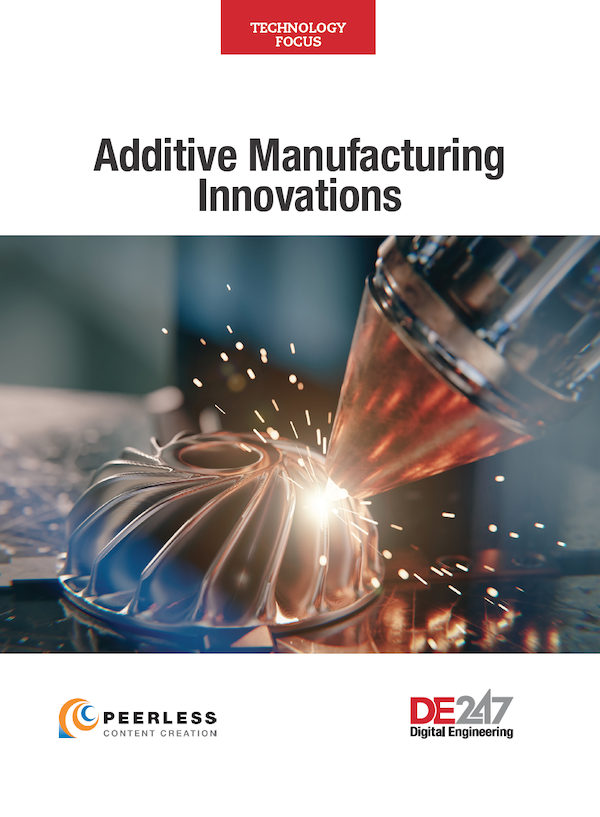America Makes Offers TRX in Conjunction with RAPID + TCT
America Makes says projects will help drive innovation and expand the industry's applications across various sectors.
Latest News
July 1, 2024
America Makes hosted a special Technical Review & Exchange (TRX) event in late June during the annual RAPID + TCT Conference in Los Angeles, CA. Under the backdrop of North America’s large industrial and additive manufacturing (AM) event, the Institute welcomed over 75 engineers, decision-makers, government, members, and partners from every corner of the U.S. AM industry.
The abbreviated TRX event included an Industry Day announcement for a $2.1M project call, as well as presentations on four projects—three closeouts and one kickoff. Speakers included Brent Roeder from R3 Digital Sciences, Inc., Christopher D. Immer from GE Aerospace Research, Ryan Meeker from the University of Dayton Research Institute, and Kevin Orbine from Deloitte Consulting. Each provided progress updates of their ongoing research and development (R&D) efforts with insight into the latest advancements underway to advance additive technology.
TRX attendees were also provided extended access to RAPID’s groundbreaking product announcements, hands-on exhibits, and real-world AM solutions.
“To further advance the Institutes’ efforts to collaborate, catalyze, and convene the AM ecosystem, we must remain connected with the AM community and its stakeholders,” says John Wilczynski, America Makes Executive Director. “RAPID+TCT is a premiere event within the industry, and we welcomed the opportunity to team up to offer our first-ever integrated TRX event.”
Projects Presented at TRX
Frameworks for Utilizing Process Monitoring in Conjunction with Ex-situ Inspection for Qualification
(5001.004.001.001)
Currently, there is a need for LPBF in-situ process monitoring frameworks that can minimize post-build part inspection requirements while still preventing escapes. However, as it remains, developing such a framework is cost-prohibitive with an overflow of data. During his presentation on the project, Roeder stated that his team is developing a specification prioritizing the qualities of in-situ process monitoring frameworks to meet
this need and at cost. Harnessing artificial intelligence (AI), they will analyze datasets to establish the best in-situ monitoring framework to accurately predict laser powder bed fusion (LPBF) and Directed Energy Deposition (DED) AM process outcomes.
Fast-Scanning-Mirror Wobble-Enabled Build Schema (Fast-WEBS) (5001.004.001.002)
The demand for quicker production is essential and the Fast-Scanning-Mirror Wobble-Enabled Build Schema (Fast-WEBS) is a project determined to increase the bulk build rate of LPBFAM. However, increasing the build rates presents a challenge resulting in higher part production throughput, becoming one of the main barriers to entry into the additive industry. As detailed in Immer’s presentation, GE will attempt to build at 3x speed while attempting to maintain high material quality in the Ti-6AI-4V alloy, using a high-frequency wobble-based thermal manipulation framework integrated with the fast-scanning mirror (FSM). This approach manipulates thermal energy distribution to withstand high power and scan speeds.
Sensor-Based Approaches to LPBF Machine Pre-Qualification (102575.000.5567.003)
Machine prequalification is important among machine types and part manufacturers, however, due to diverse designs of machines, qualification practices vary widely. This project, led by The University of Dayton Research Institute (UDRI) in collaboration with ZEISS Northrop Grumman (NGC), and The Ohio State University (OSU), aims to address this challenge by creating an in-situ sensor demonstrating consistent quantification of gas flow effects on end part quality. This project intends to acquire information from gas flow characterization sensor-based data sets to pre-qualify machines. Ultimately, this allows for manufacturers to produce quality parts throughout the additive manufacturing (AM) supply chain.
Methods and Approaches for Sustainable Operations - Should vs. Could (5001.004.001.003)
In the United States, the casting and forging (C&F) supply chain is struggling to meet high demand. America Makes and Deloitte partnered to address this issue by exploring how stopgap AM parts can aid the C&F supply chain problem. In this, the “Should vs. Could” project was established, which encompasses a structured training program designed for in-person and virtual delivery. The Techno-Economic Analysis (TEA), component of this project intends to educate first-order decision-making on effectively applying AM for stopgap measures amid the C&F supply chain challenges. This program is designed to enhance the decision-making process regarding the implementation of AM solutions.
Sources: Press materials received from the company and additional information gleaned from the company’s website.
Subscribe to our FREE magazine, FREE email newsletters or both!
Latest News
About the Author
DE’s editors contribute news and new product announcements to Digital Engineering.
Press releases may be sent to them via DE-Editors@digitaleng.news.






